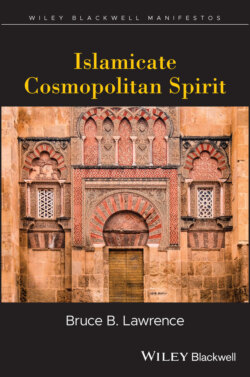Читать книгу Islamicate Cosmopolitan Spirit - Bruce B. Lawrence - Страница 10
Why Islamicate? Because a New Vocabulary Is Needed
ОглавлениеThe very act of defending Islam detracts from the deeper layers of cultural complexity that affect the domain where Islam has been introduced and Muslims are prevalent, either as majority or minority citizens. I move beyond the impasse it creates. I attempt to retrieve the larger contour of global history marked by Islam and Muslims. Throughout this manifesto I recuperate “Islam” and “Muslim” by locating both in a third referent, Islamicate. I argue that one cannot simply refute the notion that Islam is violent, or that Muslims are all Islamists; one must have a counternarrative that infuses the longer trajectory of Islam with elements that do not erase violence but instead reduce its dominance as the sole or main activity of Muslim subjects.
Let me give an instance of how difficult it is when even scholars ignore the role that “violence” plays in shaping every effort to address “Islam” or evaluate “Muslims.” The late Shahab Ahmed, a skilled interpreter of Muslim intellectual history, tried to recuperate Islam from violence by generalizing the scope of Islam and minimizing its violent subset. Ahmed argued that in all instances, no matter the activity or its register, only “Islamic” satisfies the requirements of being Muslim or being linked to Islam. He wrote his own manifesto, in the form of an extended dialogue with prior scholars on Islam and Islamic history. He justifies his preference for Islam over Islamicate as follows:
As long as the Muslim actor is making his act of violence meaningful to himself in terms of Islam … then it is appropriate and meaningful to speak of that act of violence as Islamic violence. The point of the designation is not that Islam causes this violence; rather it is that the violence is made meaningful by the act or in terms of Islam … One Muslim may disagree with another Muslim over whether his mode of meaning-making is legitimate—that is to say, whether it is coherent with its source—and may on those terms of incoherence deem the professed Muslim actor a non-Muslim, but the point is whether the actor makes the act meaningful for himself in terms of Islam.3
But what is the substantive basis of Islam apart from individual agency? Once we posit that there is no Islam beyond what individual Muslims say it is, then all who claim to speak on behalf of Islam as genuine, observant Muslims are correct, even when they differ. There are no “bad” Muslims and there is no “incorrect” Islam. That reductionism needs to be avoided but it can only be avoided if we use “religious labels” with attention to their historical context. To be Islamic in the 21st century, as in the 11th century, means more than being a believer in Allah, and a follower of Muhammad. But what is the extra element beyond the religious label, however refined and redefined? One has to look at other avenues of meaning, other vistas of hope in the long history of what I prefer to call Islamicate civilization. I argue in this manifesto that one needs to suspend the religious labeling of everyone Muslim, or mislabeling of Muslim as Islamist, in order to find that other sphere of origin and influence. Like Hodgson, I call that larger element “Islamicate” because it draws on Muslim/Islamic antecedents but out of an expansive reservoir of human experience and expression that exceeds religion. It is not secular but centripetal, always attracting a mixture of elements that are both religious and cultural.
Islamicate is at once social and political, aesthetic and literary yet always in flux. According to one of its recent, eloquent definitions, “Islamicate = the hybrid trace rather than pure presence or absence of Islam.”4 Islamicate traces can be antecedent or subsequent,5 before or after “Islam,” but in every instance they exceed objective analysis since they are in-between markers, reflecting gray rather than black and white, ambiguity and flexibility rather than fixity, rigidity, or “objectivity.” As one frequent traveller to many Muslim domains, Asian and African, has noted: “Islamicate = Islam filtered in diverse contexts, reflecting synergy between Muslims and non-Muslims apart from creedal or ritual allegiances.”6 Whether Islam filtered or Islam as hybrid trace, “Islamicate” exceeds binary categories or narrow norms of identity. It inflects fuzzy or barzakh logic, as I will explain below.
